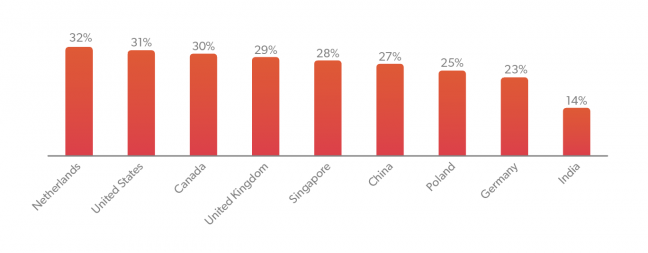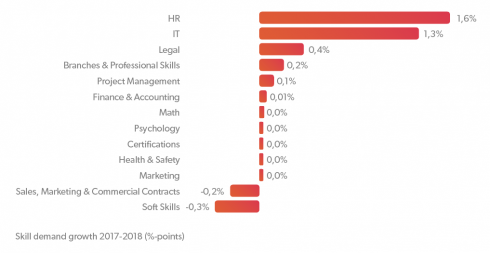29.07.2019
Future of HR
Every organization, company, your boss, colleagues, and the media are talking about Artificial Intelligence or Big Data technologies and its potentials and risks. We all hear, read and think about how it changes the way we work, communicate, process information and share knowledge with others. It influences all aspects of our private and working lives – whether we want it or not. In this process, HR departments are not an exception, but a central part of the transformation.
HR is at the forefront for two reasons: first, central tasks of HR like recruiting, onboarding, talent management, and career planning are directly influenced by digitalization and complemented by chatbots, workforce analytics, or real-time digital learning platforms. In this sense, the digitalization enables HR to focus more on the strategic and human side, while parts of the manual and repetitive can be automated by emerging technologies. Second, HR is responsible for designing a workplace characterized by open collaboration, knowledge sharing as well as ongoing and personalized up- and reskilling possibilities. Due to increasing technological permeation and changing employee expectations, HR oversees creating an effective symbiosis between humans and machines with an emphasis on meaningful work and transparent decision-making.
Is HR ready for this transformation?
HRForecast has been working for over five years on the question of how HR should transform, develop and position itself. For more than five years we have analyzed the most various data from different areas and have formed an impressive voluminous data base. In order to examine whether HR has adapted to a changing business environment and in the cooperation with ESCP Business School we analyzed HR departments globally in the world. We have gathered and analyzed more than 120,000 HR-specific job postings from nine target countries.
Figure 1 reveals the results regarding the future orientation score of the analyzed countries. Although the most differences are small, there are some interesting variations: personnel departments in the Netherlands, the United States and Canada seem to have mostly recognised future trends and have begun to implement these findings in qualification requirements that are translated into job advertisements. There is a drastic decline in the last countries on the list. India, taking the ninth place, has a readiness score of only half of that of the Netherlands. Surprisingly, Germany, possessing its 23%, lacks behind the expectations and leans to the least future-oriented countries.
The results provide a first indicator of international distinctions in the process of adapting human resources to future challenges. Overall, it can be assumed that the HR departments of German and Indian organisations still mainly perform administrative tasks that respond to the need for more traditional and rather obsolete skills. On the other hand, personnel departments in the Netherlands and the United States tend to have partly climbed the company's career ladder, leading to the emergence of new roles and skills.
Figure 1: Future readiness score (all countries, 2017-2018)

Source: Own calculations
It is important to understand which skills are increasingly required and which are losing importance. Figure 2 illustrates that the demand for IT and specific HR skills is clearly on the rise. The results show that HR competencies such as recruitment, payroll, onboarding or training are emerging, keeping with the trend towards further job specification. However, it can also be assumed that most HR departments are still a long way from becoming strategic business partners and operating in their traditional functional silos. In general, the demand for IT skills increased by 1.3 percentage points between 2017 and 2018. This growth indicates a slow but continuous digitalization of personnel processes and an increasing penetration of emerging technologies. Finally, overall demand for soft skills fell by 0.3 percentage points over the same period. However, it is important to distinguish while the demand for soft skills such as interviewing, supervising, or evaluation decreased substantially, other soft skills like empathy, teamwork, or coaching were required more intensively.
Figure 2: Skill demand growth of different skill clusters (all countries included, 2017-2018)
Source: Own calculations
HR today has the need to invest in new technologies to develop an effective digital strategy. In addition, advanced IT skills are a prerequisite for optimizing and linking business processes, predicting skill shortages, building an effective data architecture, and integrating robotics into workflows.
The digitization of HR has the potential to integrate technologies such as analytics, AI or VR to implement new management practices and create a working environment that enables productivity, delivers solutions and establishes a corporate culture based on innovation, collaboration and exchange. Digital transformation is happening fast, and HR should see it as an opportunity to step up the organizational ladder and help drive digital transformation.
Christian Vetter
Christian Vetter is one of the founders of the German HR tech startup HRForecast. Due to his interdisciplinary experience in industry and consulting, he has gained a broad expertise in both, strategic human resource management as well as innovative data technologies. He is dedicated to data-driven decision making, disruptive technologies and next-generation workforce management.
Tule kuulemaan lisää aiheesta HENRYn tilaisuuteen 30.8.2019 klo. 9:00!

